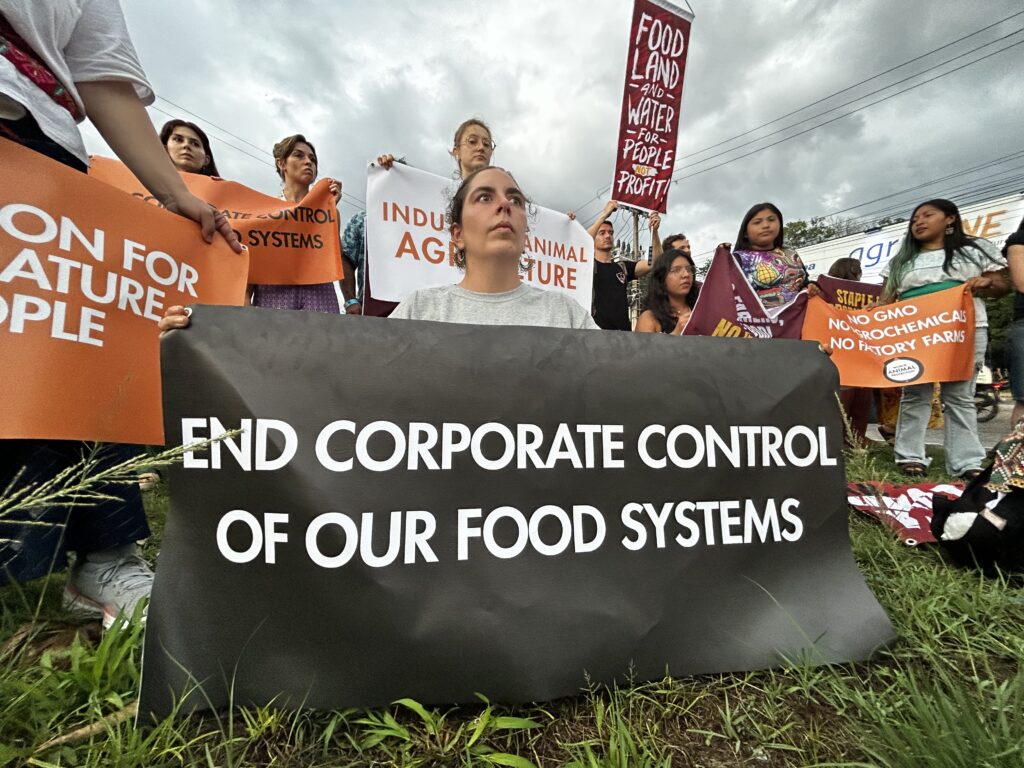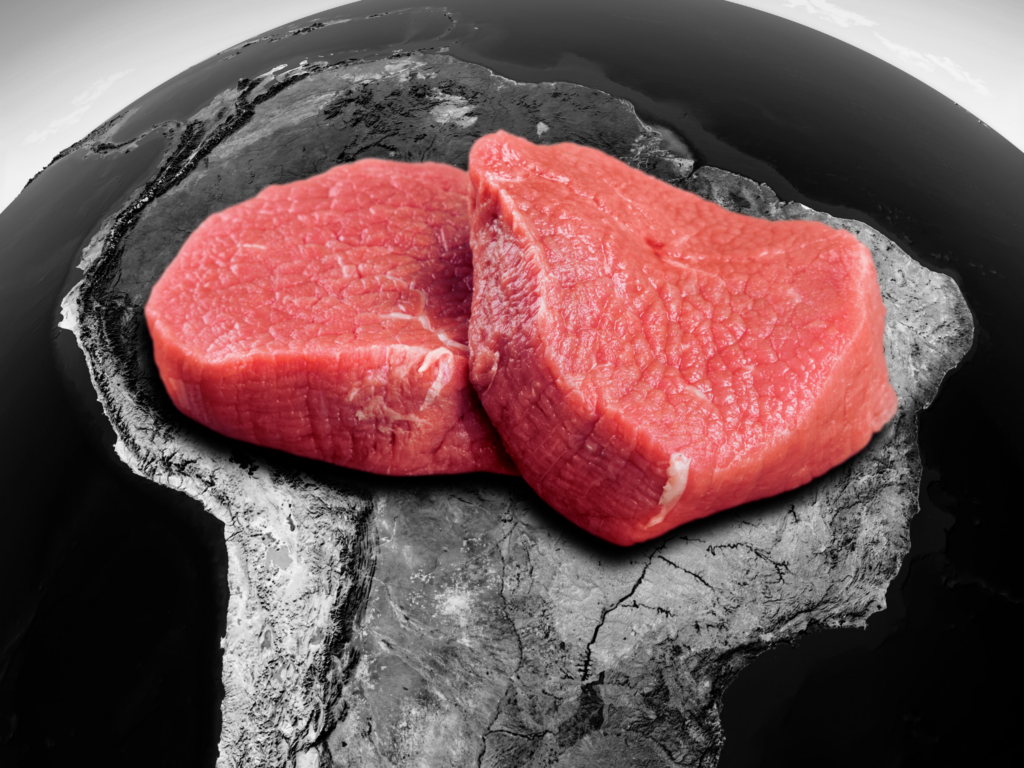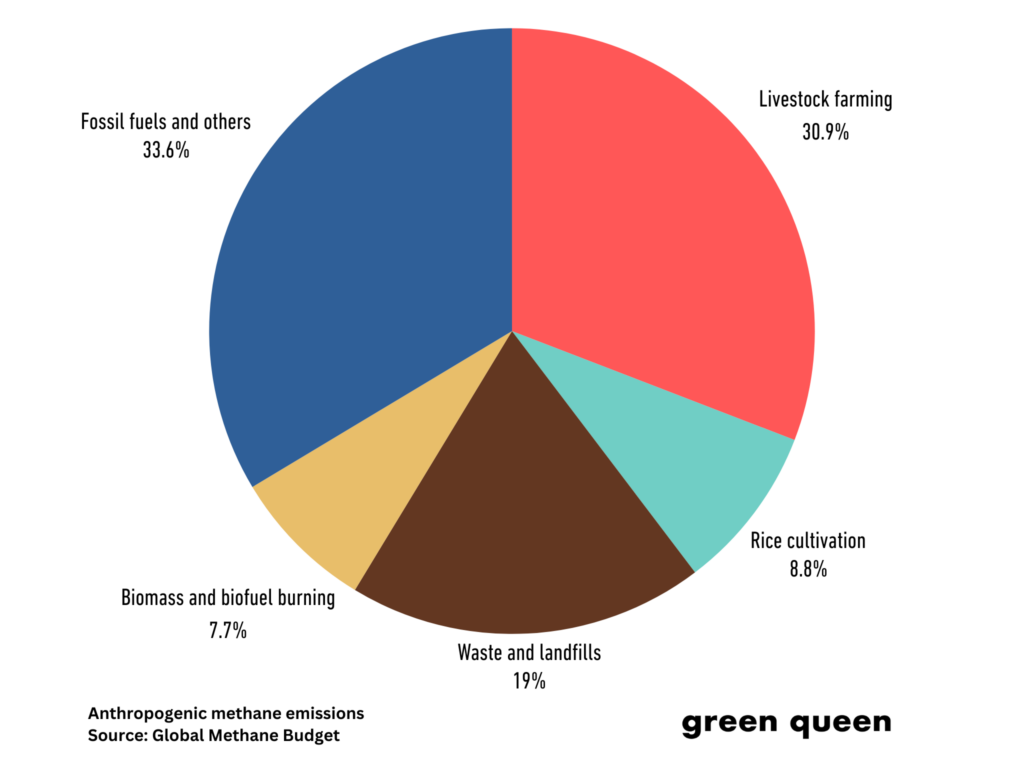
Maddy Haughton-Boakes, senior campaigner at the Changing Markets Foundation, on how the Big Ag lobby is flooding COP30, and how to curb its greenwashing efforts.
As COP30 enters its final days, an unfortunate takeaway is the agribusiness greenwash, which has flooded the summit. Industry influence has been an unfortunate addition to COPs for years, and Belém is no exception. As DeSmog reports today, there are nearly 302 agribusiness lobbyists on the ground. Of these, almost a quarter (72) come from Big Meat and Dairy, almost double the number of climate delegates of Jamaica.
These included delegates from Brazil’s two biggest meat companies JBS (also the world’s largest) and MBRF (formerly Marfrig), food giant Nestlé, and agribusiness giant Bayer, as well as groups, such as the Confederation of Agriculture and Livestock (CNA), Brazil’s most powerful agriculture lobby group, and the US-based Meat Institute and Animal Agriculture Alliance – under scrutiny for their role in the backlash to the planetary health diet.
Dozens more lobbyists attending only as part of the new, unprecedented official COP space, known as the AgriZone, remain unaccounted for. The zone, hosted by Embrapa, Brazil’s state-owned agricultural research agency, and its sponsors include major agri-corporations such as Nestlé, and Bayer (a ‘diamond sponsor’). Bayer, along with Senar, a branch of the CNA, has been linked to platforms that spread climate disinformation.
How the meat industry is influencing the UN climate summit
The AgriZone is a greenwash theatre, built to ‘dazzle negotiators’ and members of the public, while deflecting attention from industrial agriculture’s role in the climate crisis. In the entrance, you are greeted by the JBS-sponsored media centre, Canal Rural Studio. This is the same JBS that is repeatedly linked to deforestation, emissions, environmental violations and human rights abuses.
Nearby, a giant SUV, promoting ‘hybrid’ powered by ethanol, is positioned to showcase the power and influence of the Brazilian biofuel industry. (Side note: the number of bioenergy lobbyists has soared this year).
Inside, corporate-sponsored booths lure visitors with glossy, feel-good videos promoting ‘climate-smart’ farming, tech-driven efficiency narratives, and partnerships with farmers. Set to soothing music, these displays are carefully curated to show pristine fields and peaceful-looking cows.

Meanwhile, Embrapa displays dramatic videos showing climate impacts such as droughts and floods for agriculture, while claiming the solution lies in techno-fixes. The sequence crafts a deceptively simple tale: one in which agriculture is the victim, but the solution is simply more innovation, which the Brazilian industry is already working towards.
We cannot escape these messages even in the Blue Zone, the heart of COP’s decision-making. Here, we continue to find agribusiness branding and messaging, some of which is also making its way into the media. JBS is leading ‘food systems’ discussions and claiming that some of its farms ‘remove more carbon than they emit’, and MBRF is touting its supposedly ‘low-carbon’ beef.
There have been at least six screenings of the pro-industry documentary World Without Cows, produced by agribusiness company Alltech. At a panel in the Action on Food Hub, the CEO of Alltech invited everyone to join, claiming he had commissioned the film to “broaden the debate”.
However, our request for tickets was not granted, which wasn’t surprising; screenings have been heavily restricted since the film’s launch, with only industry-friendly audiences allowed to ensure glowing reviews. Only one very determined youth activist managed to get a ticket, and was able to write an honest review of the film.
The common thread is unmistakable: a focus on productivity, innovation and incremental tweaks, alongside a glaring avoidance of the urgent, science-backed reality that we need to reduce meat consumption and production, and shift toward plant-rich diets and more sustainable production methods.
The reality on the ground aligns with our recent investigation, launched in the run-up to COP. The Meat Agenda: Agricultural Exceptionalism and Greenwash in Brazil traces a pattern of corporate capture of the narrative on the road to Belém, from industry-sponsored media content and influencer campaigns. A new DeSmog analysis of this trend shows that 195 influencers, who collectively have hundreds of millions of followers, were engaged by agribusiness in 2025.

Methane action a missed opportunity at COP30
Our report also shows how agricultural methane, responsible for more than three-quarters of Brazil’s methane emissions, is glaringly absent from the country’s nationally determined contribution (NDC), and how the sector’s grip on politics threatens the implementation of the overall NDC ambition.
But this is not just a Brazilian story. The same pattern is playing out around the world. And the stakes could not be higher. The latest UN Emissions Gap report shows that current NDCs point toward 2.3–2.5°C of warming, while existing policies are closer to 2.8°C, far from the pathway needed to keep the 1.5°C threshold alive. The world is already caught in the grip of climate catastrophe: COP30 opened as the Philippines reeled from back-to-back typhoons. There is no time left for half-measures or false narratives, and high-methane-emitting sectors, including agriculture, have a key role to play.
Methane is a super-pollutant, over 80 times more warming than CO₂ in the short term and ris esponsible for nearly a third of today’s global heating. Globally, agriculture accounts for around 40% of methane emissions, most of which come from farmed animals, especially enteric fermentation (cow burps). The science says that to stay within 1.5°C, livestock methane emissions must fall by at least 25% by 2030.
Cutting these emissions is the emergency brake the world needs to pull to avoid even more catastrophic climate impacts. It has been encouraging to see a growing focus on methane at this COP, but agribusiness remains largely off the hook.

Monday’s methane ministerial missed a crucial opportunity to confront the root cause of its most significant driver: animal agriculture. With more than 150 countries signed up to the Global Methane Pledge, the world has committed to a 30% cut by 2030. But we are far from meeting that goal, as the newest UN Methane Status Report shows.
Still, there are reasons to be hopeful. Indigenous groups are refusing to be silenced, and civil society is challenging the Agrizone head-on. For the first time in years, meaningful protest has returned to the streets.
Together with partners, we’ve created vibrant spaces that expose corporate greenwash, highlight the urgency of cutting methane, and expose the industry’s aggressive push for ‘no additional warming’ approaches, a misleading use of the controversial metric, GWP*, being used to justify ‘business as usual’ approaches. (Spoiler: many of the industry lobbyists at COP are there to push for it).
The more greenwash is exposed, the harder it becomes for industry spin to dominate the conversation. In and outside the COP30 venue, across the Blue Zone, the People’s Summit, and civil-society spaces across Belém, farmers, Indigenous communities, scientists, and activists are showing how to build food systems that nourish people and the planet rather than destroy them.
And as these real solutions are discussed, debated, and demanded, the space for corporate obstruction shrinks. As the summit enters its final stretch, negotiators would do well to learn from this leadership.
The post Op-Ed: Clearing the Greenwash Fog – Challenging Agribusiness Influence at COP30 appeared first on Green Queen.
This post was originally published on Green Queen.